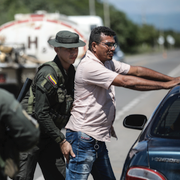
Polisens jakt på kidnapparna – belöning utropad
En hittelön på 200 miljoner pesos har utropats till den som kan bidra med information i jakten på de som kidnappade fotbollsstjärnan Luis Diaz pappa. Det rapporterar Fotbollskanalen.
Det är polisens generaldirektör – spaningsledaren William Salamanca – som gått ut med information om belöningen, som motsvarar 540 000 kronor.
Natten mot söndagen kidnappades Liverpoolstjärnans föräldrar i den colombianska staden Barrancas. Kort senare kom beskedet att mamman fritagits av polis. Pappan är däremot fortsatt i kidnapparnas förvar.
bakgrund
Kidnappningar i Colombia
Wikipedia (en)
Kidnappings in Colombia refers to the practice of kidnapping in the Republic of Colombia. This criminal practice was first introduced in modern Colombian history during the early 1970s by the guerrilla movements and, later, also by criminal groups. With the release of Colombian presidential candidate Ingrid Betancourt on July 2, 2008 this practice gained worldwide notoriety.
Guerrilla groups like the M-19, the FARC, ELN among others widely exploited this practice. To counter these paramilitary groups also adopted this method to intimidate adversaries. Drug cartels like the Medellín Cartel also used this practice to intimidate politicians who were trying to approve in congress an extradition treaty with the United States, and also used in drug cartel wars. Regular criminal organizations also kidnap and sell persons of interest to guerrilla groups.
Police in Colombia say the number of people kidnapped has fallen 92% since 2000. Common criminals are now the perpetrators of the overwhelming majority of kidnappings.According to a 2022 study by political scientist Danielle Gilbert, armed groups in Colombia engage in ransom kidnappings as a way to maintain the armed groups' local systems of taxation. The groups resort to ransom kidnappings to punish tax evasion and incentivize inhabitants not to shirk.
Barrancas
Omni är politiskt obundna och oberoende. Vi strävar efter att ge fler perspektiv på nyheterna. Har du frågor eller synpunkter kring vår rapportering? Kontakta redaktionen



